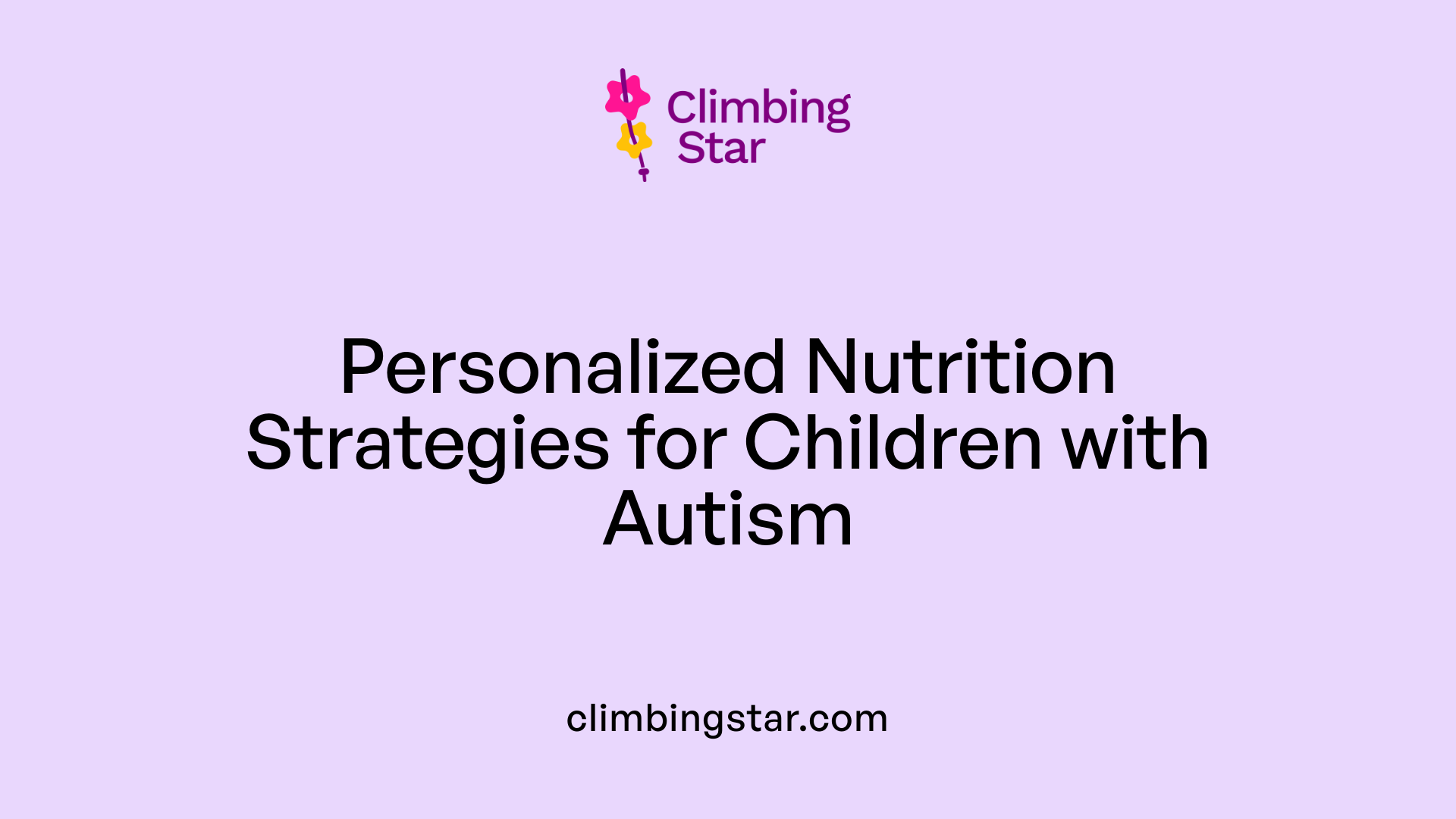Understanding the Role of Food in Autism Management
Nutrition plays a vital role in supporting children with autism spectrum disorder (ASD). A balanced, nutrient-rich diet tailored to individual sensitivities and needs can help improve behavioral, gastrointestinal, and developmental outcomes. This article explores essential nutrients, recommended foods, dietary strategies, and available resources to guide caregivers in creating effective food plans that promote health and well-being for children on the spectrum.
Key Nutrients for Children with Autism

What vitamins and minerals are essential for children with autism?
Children with autism often require specific nutrients to support their growth, development, and overall health. Critical vitamins include Vitamin A, D, and K, which play roles in immune function, bone health, and cellular processes. Minerals such as calcium, iron, magnesium, phosphorus, and choline are also vital, contributing to bone strength, oxygen transport, nerve function, and brain development.
A balanced intake from diverse food sources is necessary to meet these nutritional needs. Dairy products, leafy greens, beans, nuts, eggs, and fish are excellent sources of these nutrients. Fortified foods and fruits further supplement the diet, ensuring children receive a broad spectrum of essential vitamins and minerals.
Why are omega-3 fatty acids particularly important?
Omega-3 fatty acids, especially EPA and DHA, are crucial for brain development and functioning. Children with autism often have lower levels of these fats, which are vital for neural cell membrane integrity and signal transmission. Incorporating omega-3-rich sources like salmon, tuna, sardines, flaxseeds, chia seeds, and walnuts can help improve behavior, mood, and social interactions.
Research suggests that supplementing omega-3s may offer benefits in managing autism symptoms, although more studies are needed to confirm these effects fully.
How does fiber, potassium, and antioxidants promote gut health and reduce inflammation?
Fiber-rich foods such as beans, lentils, whole grains, fruits, vegetables, nuts, and seeds support digestive health by promoting regular bowel movements and nourishing beneficial gut bacteria. Potassium, found in bananas, potatoes, and spinach, helps maintain fluid balance and supports nerve function, which can influence behavioral and cognitive functions. Antioxidants from colorful fruits and vegetables combat oxidative stress and inflammation, common concerns in autism. These substances, along with phytochemicals, help reduce systemic inflammation and support overall health.
Maintaining a diet with these nutrients not only supports physical health but may also positively impact behavioral challenges associated with autism.
The Impact of Diet on Autism Spectrum Disorder

How does diet affect autism spectrum disorder?
Diet plays a vital role in managing autism spectrum disorder (ASD) by affecting both behavioral symptoms and gastrointestinal (GI) health. Children with autism often face unique nutritional challenges, including food selectivity and sensitivities that can lead to deficiencies in essential nutrients such as calcium, vitamins A, D, K, iron, magnesium, and choline. These deficiencies may influence growth, brain development, immune function, and overall well-being.
A balanced diet that incorporates a variety of food groups is crucial for optimal health. Foods rich in nutrients like omega-3 fatty acids—found in fish, walnuts, and flaxseeds—are particularly important because children with autism tend to have lower levels of these fats, which are essential for brain function. Ensuring adequate intake of fiber from beans, lentils, fruits, vegetables, and whole grains supports gut health and helps stabilize blood sugar levels.
Addressing gastrointestinal issues common in children with ASD is also an important aspect of dietary management. Supporting gut health through probiotic-rich foods such as yogurt, kefir, sauerkraut, and kimchi, combined with fiber intake, can help restore gut balance. This is significant because gut health is increasingly recognized to influence behavior and cognitive function.
Potential benefits of gluten-free and casein-free diets, and the current state of research.
Among dietary interventions for ASD, the gluten-free and casein-free (GFCF) diets are frequently discussed. These diets eliminate gluten, found in wheat, barley, and rye, and casein, found in dairy products. The rationale is that peptides derived from gluten and casein might interfere with brain function in sensitive individuals.
Research on the effectiveness of GFCF diets shows mixed results. Some studies suggest that certain children experience improvements in behavior, language, and GI symptoms when following these diets. For example, some reports indicate reduced hyperactivity and better social engagement, while others find no significant benefits.
Current scientific evidence does not conclusively prove that GFCF diets are universally effective for ASD. Furthermore, restricting these food groups without proper nutritional planning can lead to deficiencies in important nutrients like calcium, vitamin D, and protein, which are vital for healthy growth. Therefore, implementing a GFCF diet should be done under professional guidance to avoid nutritional risks.
Overall, while some children may benefit from such dietary modifications, they are not a cure and should complement other evidence-based therapies. Ongoing research continues to explore the mechanisms behind dietary effects in ASD, aiming to develop personalized nutrition plans backed by scientific data.
| Diet Type | Potential Benefits | Risks and Considerations | Evidence Level |
|---|---|---|---|
| Gluten-Free & Casein-Free | Improved behavior, GI symptoms | Nutritional deficiencies if not properly managed | Mixed, more research needed |
| General Balanced Diet | Supports growth, detoxification, brain health | Nutritional adequacy, individual food sensitivities | Strong, consensus for tailored plans |
| Supplementation (omega-3s, vitamins) | Brain development, mood improvement | Interaction with medications, dosage considerations | Growing, supported by multiple studies |
In conclusion, diet significantly influences the health and behavior of children with autism. Personalized nutrition strategies, considering individual sensitivities and nutritional needs, can help optimize health outcomes. Whether through enhancing gut health, ensuring balanced nutrient intake, or carefully evaluating specific diets like GFCF, dietary management remains a cornerstone of supportive care for ASD.
Foods to Include, Limit, and Avoid in an Autism-Friendly Diet

What foods should be included, limited, or avoided for children with autism?
Children with autism thrive on a diet rich in essential nutrients that support their growth and overall health. Foods such as fish (like salmon and sardines), fruits, vegetables, whole grains, beans, nuts, seeds, eggs, and dairy products provide vital vitamins and minerals. These nutrients include omega-3 fatty acids (EPA and DHA), vitamins A, D, K, B6, C, magnesium, iron, calcium, potassium, phosphorus, and choline, all of which contribute to brain development, immune function, and energy levels.
However, many children with autism experience food sensitivities and allergies. Common allergens like gluten and casein (found in wheat and dairy) can potentially aggravate symptoms and should be carefully monitored or eliminated based on individual reactions. Processed foods, especially those high in sugar, artificial dyes, flavors, and preservatives, can increase hyperactivity and sensory sensitivities.
In addition to avoiding certain foods, implementing limited exposure to artificial additives and overly processed ingredients can help manage behavioral fluctuations. Because children with autism may have sensitivities to textures and tastes, gradual introduction and sensory food play can improve acceptance.
It’s crucial to tailor dietary choices to each child's specific reactions. Addressing dental issues or reflux that might impair eating is also important. Supporting mealtimes with routines, family involvement, and a calm environment encourages healthier eating habits.
Can you provide sample meal plans for autism-related diets?
Designing meal plans that cater to children with autism involves balancing nutritional needs with sensory preferences. Incorporating omega-3-rich foods like fatty fish, chia seeds, walnuts, and flaxseeds supports brain health. Fresh fruits and vegetables supply antioxidants, fiber, and essential nutrients vital for reducing inflammation and maintaining gut health.
Whole grains and legumes—such as quinoa, brown rice, and lentils—enhance digestion and nutrition. For children on gluten-free and casein-free diets, ensuring nutritional adequacy requires careful meal planning, often with professional guidance.
Here's a sample day:
- Breakfast: Oatmeal with chia seeds, mixed berries, and a glass of fortified plant-based milk.
- Snack: Carrot sticks and hummus.
- Lunch: Grilled salmon, quinoa salad with leafy greens, cucumber, and olive oil.
- Snack: A handful of walnuts and an apple.
- Dinner: Lentil stew with vegetables, served with gluten-free bread.
Mealtimes should also incorporate sensory-friendly preparation and gradual exposure techniques. Creating consistent routines and a relaxed eating environment fosters acceptance and helps establish healthy habits.
In conclusion, an autism-friendly diet focuses on nutrient-rich, minimally processed, and sensory-conducive foods tailored to individual needs. Combining these dietary principles with supportive mealtime strategies can significantly improve health and well-being.
Therapeutic Diets and Their Benefits for Children with Autism

What are therapeutic diets for autism, and how can they benefit children?
Therapeutic diets such as gluten-free, casein-free, ketogenic, Feingold, and specific carbohydrate diets are tailored nutritional approaches aimed at alleviating some of the symptoms associated with autism. These diets target underlying biological processes and address gut health issues that are often observed in autistic children.
The primary goal is to reduce behavioral challenges, gastrointestinal discomfort, and social difficulties by modifying food intake. Many children with autism have food sensitivities or allergies, particularly to gluten (found in wheat) and casein (found in dairy), which may impact brain function and behavior.
Research indicates that when implemented carefully and under professional guidance, these diets can lead to improvements in attention, cognition, social interaction, and overall gastrointestinal health. For example, removing gluten and casein from the diet may decrease the production of peptides that could influence brain activity, potentially easing some autism symptoms.
Evidence also suggests that ketogenic and other specialized carbohydrate diets can have positive effects, especially in cases with co-occurring epilepsy or significant gastrointestinal issues. These diets often promote better gut function, which might contribute to behavioral improvements through the gut-brain connection.
It is important to note that these diets are not universally effective for all children. Their success varies depending on individual genetics, sensitivities, and the presence of other health conditions. Consequently, dietary interventions must be personalized, monitored by healthcare professionals, and complemented by other treatments such as behavioral therapies and nutritional supplementation.
Potential improvements in core symptoms and GI health when diets are properly managed
When autism-related diets are carefully managed, children may experience several benefits. Many children show moderate to significant improvements in core symptoms such as hyperactivity, attention span, social engagement, and communication.
Gastrointestinal health often sees notable enhancement, with reductions in symptoms like bloating, constipation, diarrhea, and abdominal pain. These improvements may directly influence behavioral regulation, emotional stability, and learning ability.
Studies have also highlighted the importance of combining diet modifications with other supportive measures, including probiotics to restore gut balance, vitamin and mineral supplementation, and behavioral therapy.
Ensuring a nutritionally complete diet while eliminating problematic foods is crucial to avoid deficiencies. For instance, removing gluten and casein can sometimes lead to nutritional gaps, so appropriate supplementation or alternative nutrient sources should be incorporated.
In summary, therapeutic diets hold promise as part of a comprehensive autism management plan. When tailored properly, they can promote better physical health, enhance behavior, and improve quality of life.
| Diet Type | Description | Potential Benefits | Implementation Notes |
|---|---|---|---|
| Gluten-Free | Eliminates wheat and gluten-containing grains | Reduces gastrointestinal issues, behavioral symptoms | Needs careful planning to avoid nutritional deficiencies |
| Casein-Free | Removes dairy products | May improve mood and social skills | Supplements may be necessary to meet calcium needs |
| Ketogenic | High-fat, low-carb diet | Supports gastrointestinal health, may reduce seizures | Medical supervision essential |
| Specific Carbohydrate | Limits certain carbohydrates to improve gut flora | Enhances gut health, reduces inflammation | Usually requires dietitian guidance |
Understanding these diets and adapting them carefully can help optimize health and functioning in children with autism.
Strategies for Implementing an Autism-Friendly Diet

What are some dietary guidelines and nutritional strategies for children with autism?
Children with autism often face unique dietary challenges that require personalized strategies to ensure they receive proper nutrition for growth and health. A fundamental aspect is to focus on foods rich in essential vitamins and minerals such as vitamin A, D, K, calcium, iron, fiber, potassium, magnesium, phosphorus, and choline. These nutrients support brain development, immune function, and overall growth.
Since children with autism may develop food sensitivities and aversions, it’s important to tailor their diet plans. Foods like dairy products, leafy greens, beans, nuts, eggs, fish, fruits, and fortified foods are recommended sources of crucial nutrients. For example, omega-3 fatty acids found in fish, flaxseeds, and walnuts are particularly beneficial for brain function. Including a variety of fruits and vegetables provides antioxidants and phytochemicals that may help reduce inflammation.
Nutritional strategies also involve examining the potential effects of special diets. The gluten-free and casein-free diets are popular among some caregivers, yet current research does not conclusively prove their effectiveness. These diets may pose nutritional risks if not properly managed, so working with healthcare providers is essential.
Supporting gut health through probiotics and digestive enzymes can be beneficial, especially since gastrointestinal issues are common in children with autism. Foods like yogurt, kefir, sauerkraut, and kimchi are rich in probiotics, promoting a healthy gut environment. Proper gut health may assist in improving behavioral symptoms.
Blood sugar stability is another focus, with recommendations to reduce sugar and processed foods while increasing whole foods such as legumes, whole grains, and fresh produce. This can help manage hyperactivity and behavioral fluctuations. Additionally, supplementing with omega-3 fatty acids—particularly EPA and DHA—has shown to improve mood, behavior, and social skills.
Vitamins B6, C, magnesium, vitamin A, and vitamin D supplements have demonstrated potential benefits; however, they should be used under medical supervision. Ensuring children avoid common food allergens like gluten and casein might also reduce peptides that could influence brain function.
Incorporating a variety of protein sources—from both animal and plant origins—supports healthy growth and immune health. Animal sources include meat, fish, eggs, and dairy, whereas plant-based options include beans, nuts, seeds, quinoa, and chickpeas.
Creating an accommodating mealtime environment plays a significant role in enhancing food acceptance. Introducing new foods gradually helps children adapt without overwhelming their senses. Making meals positive and stress-free encourages a better relationship with food.
Involving children in food choices fosters autonomy and interest, making mealtimes more engaging. Using visual aids and involving them in cooking can improve their willingness to try new foods.
For optimal effectiveness, these dietary strategies should be implemented as part of a comprehensive approach that includes the guidance of registered dietitians and occupational therapists. Tailoring eating plans to individual preferences and sensitivities ensures a balanced, nutritious, and enjoyable mealtime experience.
How to introduce new foods gradually and create positive mealtime environments?
Introducing new foods gradually helps children with autism adapt and reduces anxiety associated with unfamiliar tastes and textures. Start by offering small portions along with favorite foods, using positive reinforcement such as praise or rewards.
Establishing a calm and predictable mealtime environment also minimizes sensory overload. Dim lighting, a quiet setting, and minimal distractions can make mealtime more comfortable.
Involving children in food choices and preparation fosters a sense of control and curiosity. Shopping for groceries together, choosing new recipes, or helping with simple cooking tasks can increase their interest in eating and reduce resistance.
By combining gradual introduction of foods with supportive mealtime practices, caregivers can help children develop healthier eating habits and expand their dietary variety. This approach not only ensures nutritional adequacy but also promotes a positive relationship with food.
Supporting Autism Through Informed Food Choices
By understanding the essential nutrients, dietary strategies, and available resources, caregivers can create customized food plans that support the health and developmental needs of children with autism. Emphasizing a balanced intake of fruits, vegetables, proteins, omega-3 fatty acids, and gut-friendly foods can promote overall well-being, reduce behavioral challenges, and enhance quality of life. Collaboration with healthcare professionals and ongoing education are key to implementing effective, sustainable diets that respect individual sensitivities and preferences. Ultimately, an informed approach to nutrition can serve as a powerful tool in managing autism symptoms and supporting children to thrive.
References
- Autism Food List
- Diet for Autism | Food for the Brain Foundation
- Autism Diet List: Choosing Nourishing Foods for Autism
- Foods to avoid with autism
- Mealtime tips for autistic children with eating challenges
- Nutrition and Autism Spectrum Disorder: Between False ...
- Effects of Diet, Nutrition, and Exercise in Children With ...
- Nutrition and autism
- Nutrition and Autism Spectrum Disorder: Between False ...
- Autism and Nutrition: The Connection Between Diet and ...






